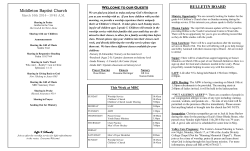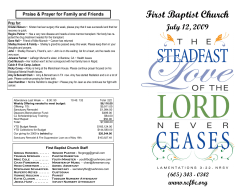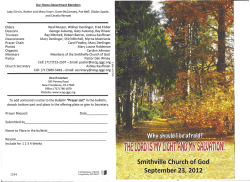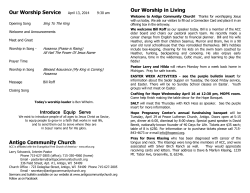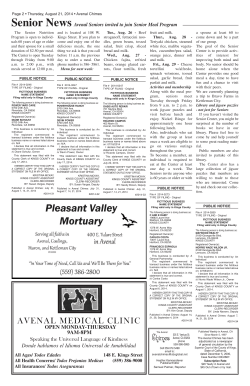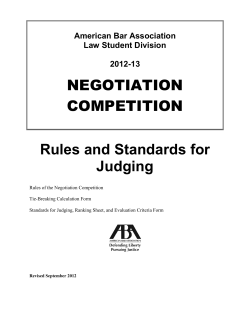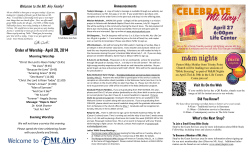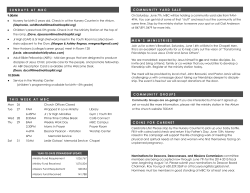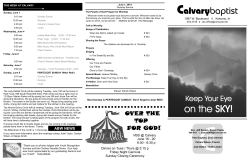
Letter to God... $EAR &ROM $ATE
Letter to God... $EAR'OD &ROM $ATE leader’s guide 11 God’s Word... The Bible is made up of 66 books, 39 Old Testament books and 27 New Testament books. The Bible was written by over 40 writers inspired by God. The Bible was written in Hebrew, Aramaic, and Greek. The Bible was written over a period of 1,600 years. The Bible was written in its present order since AD 393. The books of all other religions, focus on works. The Bible is the only book which assures us that we are saved only by the grace of God. In spite of all this time and all these writers, it contains one coherent message: “God redeems humankind” which is a shorter way of saying “God loves us, forgives us, and reunites us with God.” Building Block #2: What do we believe about the Bible? We believe that the Holy Scriptures, Old and New Testaments, are the word of God and the only perfect rule for faith, doctrine, and conduct. “All Scripture is inspired by God and is useful to teach us what is true and to make us realize what is wrong in our lives. It corrects us when we are wrong and teaches us to do what is right. God uses it to prepare and equip his people to do every good work.”—2 Timothy 3:16-17, NLT 12 The Journey 'ENESIS *OSHUA %XODUS ,EVITICUS .UMBERS $EUTERONOMY leader’s guide *UDGES 2UTH 3AMUEL 3AMUEL 13 .EHEMIAH +INGS %STHER +INGS #HRONICLES #HRONICLES %ZRA 14 *OB 0SALMS 0ROVERBS The Journey %CCLESIASTES 3ONGOF 3OLOMON )SAIAH *EREMIAH ,AMENTATIONS leader’s guide %ZEKIEL $ANIEL (OSEA *OEL !MOS 15 /BADIAH :EPHANIAH *ONAH -ICAH .AHUM (ABAKKUK 16 (AGGAI :ECHARIAH -ALACHI -ATTHEW The Journey -ARK #ORINTHIANS #ORINTHIANS ,UKE *OHN !CTS 2OMANS leader’s guide 'ALATIANS %PHESIANS 0HILIPPIANS 17 4ITUS #OLOSSIANS 4HESSALONIANS 0HILEMON (EBREWS 4HESSALONIANS 4IMOTHY 4IMOTHY 18 *AMES 0ETER The Journey 0ETER *OHN *UDE *OHN *OHN leader’s guide 2EVELATION 19 1 & 2 Thessalonians 1 & 2 Timothy Titus Philemon Hebrews Matth ew Ma rk Lu ke Jo h n Acts R om a ns Lam ent ations Eze kie l Dan iel Hosea Joe l, Am os Obadia h Jon ah R ut h l 1 & 2 Sa m ue gs in K 2 1& cles 1 & 2 Ch ro ni Ez ra Neh em ia h Esth er 4%!/.% 20 Ja m es 1 & 2 Peter 1,2 & 3 J o hn J ude Revel atio n A LL '/!, nth ia n s 1 & 2 C o ri Ga latia n s Ep h e sia n s s P h il ippia n s n ia C o lo ss Micah Nahum Habakkuk Zephaniah Haggai Zechariah Malachi Jo b Ps a l m P ro ve s Ec c le r bs S o n g s ia ste s of S o lo Is a ia m o n Je re m h ia h G e n e s is Exo du s us Lev itic rs e b Nu m o my n o r e t De u u Jos h a J ud ges 4%!47/ The Journey Old Testament Timeline... Creation, Adam and Eve The Fall PRE-HISTORY Genesis Cain and Abel Noah and the Flood Tower of Babel 2166 BC The Patriarchs and Matriarchs PATRIARCHS Genesis 1805 BC Abraham and Sarah (The Covenant) Isaac and Rebekah Jacob, Esau, Rachel, and Leah Twelve Sons Joseph Exodus Leviticus Numbers Deuteronomy Joshua EXODUS & CONQUEST Moses 1446 BC Exodus Wilderness Wandering Law and Commandments Joshua 1375 BC Samuel 1050 BC The Kings Saul David Solomon 930 BC Judah Israel KINGS 1& 2 Kings 1 & 2 Chronicles Isaiah Jeremiah The Prophets JUDGES Judges Ruth The Judges The Divided Kingdom Jeroboam and Rehoboam Elijah Isaiah CAPTIVITY Ezekiel Daniel 722 BC Assyrian Captivity 586 BC The Fall of Jerusalem 538 BC RESTORATION Ezra Nehemiah Esther leader’s guide Jeremiah Babylonian Captivity Ezekiel Daniel Ezra Nehemiah 424 BC 21 “God’s World” Instructions... 2EAD'ENESIS 2EAD'ENESIS Draw what the universe looked like before God began creating. Then draw a picture for each day of creation described in this passage. Draw what creation looked like at the end of each day. Be prepared to explain how creation developed from one day to the next. Also be ready to answer this question: Draw a picture for each day of creation described in this passage. Draw what creation looked like at the end of each day. Be prepared to explain how creation developed from one day to the next. Also be ready to answer this question: How does this passage illustrate God’s power, wisdom, and care? How does this passage illustrate God’s power, wisdom, and care? 2EAD'ENESIS 2EAD'ENESIS Draw a picture of what the earth looked like before God made humans. Then draw a picture of what the earth looked like after God made humans. Be prepared to summarize the story and answer this question: Draw at least two pictures representing this part of the story. Be prepared to summarize the story and answer this question: How does this passage illustrate God’s power, wisdom, and care? leader’s guide How does this passage illustrate God’s power, wisdom, and care? 27 Fact Finder—Creation... Look up the passages below, then answer the following questions for each Judge. Be prepared to teach others what you learn. 'EN 'EN 'EN 'EN God has the power to do what he says. God brings order out of confusion. God’s creation is good and to be enjoyed. God cares for his creation. God is our creator. God created us to have a personal relationship with him and creation. Other 28 The Journey Wonderfully, Marvelously Made... 2EAD'ENESIS 1) What pattern did God use to create humans? 2) What does it mean to you that God created you in his image? 3) What does this passage tell you about God’s creation? About the relationship God wants us to have with himself and with his creation? Now that you’ve read the passage and discussed the questions, devise a creative way to share what you learned with the rest of the class. You could do a cheer, perform a musical, give a speech in another language while someone else translates, or communicate in any other appropriate way. You’re limited only by your creativity, a general sense of tastefulness, and a time limit of two minutes. 2EAD'ENESIS 1) Do you think the end of verse 5 gives any indication of human relationship with the rest of creation? 2) According to this passage, what action of God gave life to humans? 3) What did God provide for humans? 4) What does this passage tell you about God’s creation? About the relationship God wants us to have with himself and with his creation? Now that you’ve read the passage and discussed the questions, devise a creative way to share what you learned with the rest of the class. You could do a cheer, perform a musical, give a speech in another language while someone else translates, or communicate in any other appropriate way. You’re limited only by your creativity, a general sense of tastefulness, and a time limit of two minutes. 2EAD0SALM 2EAD0SALM 1) What do you think and feel when you look at the night sky full of the moon and stars? 2) What did the author of this psalm think and feel? Why? 3) What does it mean to you that the same God who created the universe created you? 4) What does this passage tell you about God’s creation? About the relationship God wants us to have with himself and with his creation? 1) What does this passage say about how you were made? 2) What kind of relationship did God have with you before you were born? 3) How does that make you feel about God? About yourself? 4) What does this passage tell you about God’s creation? About the relationship God wants us to have with himself and with his creation? Now that you’ve read the passage and discussed the questions, devise a creative way to share what you learned with the rest of the class. You could do a cheer, perform a musical, give a speech in another language while someone else translates, or communicate in any other appropriate way. You’re limited only by your creativity, a general sense of tastefulness, and a time limit of two minutes. Now that you’ve read the passage and discussed the questions, devise a creative way to share what you learned with the rest of the class. You could do a cheer, perform a musical, give a speech in another language while someone else translates, or communicate in any other appropriate way. You’re limited only by your creativity, a general sense of tastefulness, and a time limit of two minutes. leader’s guide 33 Sin: Four Changes for the Worse... Look up each of the passages below, then answer the questions in each section. Be prepared to teach others what you learn. Th e rel ation ship bet we en Go d an d hu ma n bei ngs cha nge d 1) Read Genesis 3:8-9, 23-24. What did Adam and Eve do when God came to walk in the garden with them? Why? When people gave into temptation and sinned, they separated themselves from God. had Th e fe el in g th at pe op le ge d ab ou t th em se lves ch an 1) Read Genesis 2:25. How did Adam and Eve feel about themselves at this point? 2) Read Genesis 3:7-10. How did Adam and Eve feel about themselves at this point? 3) What changed? Sin changes how we feel about ourselves. When we disobey God we no longer can adequately and clearly reflect God’s image. We feel guilty and ashamed. And when we feel guilty and ashamed we just don’t feel good about ourselves. leader’s guide 41 Th e rel ation ships bet we en people cha nge d 1) Read Genesis 3:11-13. What happened between Adam and Eve in this part of the story? Sin opens the way for blaming others so that we don’t have to take responsibility for our own actions. Instead of peace and harmony, we now struggle to relate with each other. Creation ch an ge d 1) Read Genesis 3:17-18. What happened to the Garden of Eden after the humans sinned? 2) Read Romans 8:19-21. For what is “all creation” waiting? Our sin brings thorns and thistles into the beauty of Cod’s creation. It brings death, destruction, and decay. Everything God made suffers because of sin. Building Block #5 What Is Sin? Sin is all in thought, word, and deed that is contrary to the will of God. “Anyone, then, who knows the right thing to do and fails to do it, commits sin” (James 4:17). 1) How does Adam and Eve’s story illustrate this Building Block? 42 The Journey leader’s guide Have the rest of the group play the parts of people who met Cain after he was cursed. As your reader reads the story, each character should silently act out his or her part. Use your imagination, but keep it serious. Use the remaining preparation time to practice your play. 1) Read the story aloud. 2) Play the part of Cain. 3) Play the part of Abel. 4) Play the part of God’s voice. Now prepare to act out Cain’s story for the whole class. Choose a group member to do each of the following: 1) Why was Cain so angry? How did he handle his anger? 2) What makes you angry? How do you handle your anger? 3) What promise and what warning did God give Cain? 4) What promises of acceptance has God given us in the Bible? What warnings about the dangers of sin has he given us, too? 5) When God asked about Abel, who was missing, what was Cain’s answer? 6) What were the consequences of Cain’s sin? 7) How did God respond when Cain cried for mercy? 8) In what ways has God promised to protect us? Read Genesis 4:1-16. #AINAND!BEL When the class gathers back together and it’s your turn to present your story, have one person summarize the events. Then have the class form two teams. Have teams alternate in finding words in your puzzle. As teams find words, explain how these words tie to the story and to the subject of sin and its consequences. 1) Make a list of nine key words from this story about Noah, such as “righteous” or “ark.” 2) Put each of these words somewhere in the grid, placing one letter in each square on the grid. Start with the longest words. You can write the words horizontally, vertically, or diagonally, and forward or backward. 3) Fill in any leftover blank squares with random letters. Create a word search on the newsprint with the grid. 1) What two things did God observe about people that finally drove him to destroy them? 2) What did God feel about what humans were doing? 3) During this time, what did God do with Noah, his family, and the animals? 4) Why did God treat Noah this way? 5) What can we learn from Noah’s example about how to live today? 6) What hope is there in this passage? Read Genesis 6:1-22. .OAHANDTHE&LOOD Sin: A Growing Problem, part 1... 47 48 Using the materials provided, create a mobile about the covenant God made with Noah. Be prepared to explain how each element on your mobile relates to Noah’s story. Choose one person to explain your work to the class. 1) After the flood, how was Noah supposed to interact with the animals? 2) What did God command Noah and his sons to do? 3) What did he forbid them to do? What was the consequence if they disobeyed? 4) What was God’s promise to Noah and the animals? 5) What are a few promises God has given us as Christians that give us hope for the future? Read Genesis 8:13-22; 9:1-17. 'ODS0ROMISE On sheets of paper, write words in different languages (make up words if you wish), and tape the sheets of paper to the tower—this will be your presentation to the class. Now build the city of Babel. Start by forming your chairs into a circle. Leave a space for the front gate. Within the “city,” build a tower of Babel using the boxes provided. Make it as tall as you can! (Can you reach the ceiling?) 1) How many languages existed at the beginning of this story? 2) What did the people decide to build? Why? 3) What things are you tempted to brag about? 4) Is bragging ever sinful? Why or why not? Is it ever good? Why or why not? 5) What did God foresee would happen when the people finished their construction project? 6) In this story, what were the consequences of sin? 7) What are some consequences of sinful bragging? Read Genesis 11:1-9. 4OWEROF"ABEL Sin: A Growing Problem, part 2... The Journey Moses Word Search " , / % ) + , ) 3 , / . 1 5 , " 3 3 2 68 / 3 0 , ) ! , ' % / % / ! ) , ) ) / $ $ 4 ! " 17 . . 3 2 % 3 , 0 ! ( 2 & % 3 0 2 ! ! ! . / ' $ , 9 ) 2 2 % ! 4 6 ! $ ' # 4 5 , + $ " % % % + 3 4 2 % 3 % $ 2 The Journey The Tabernacle (a) Courtyard (b) Bronze Altar (c) Bronze Basin (d) Holy Place (e) Holy of Holies 74 (f) Lampstand (g) Bread Table (h) Altar of Incense (i) Ark of the Covenant The Journey Types of Offerings... Look up each of the Scripture passages below, then draw a line from the Scripture reference to the correct title in the left column and another line to the correct meaning in the right column. 'UILT /FFERING ,EVITICUS &ELLOWSHIP /FFERING ,EVITICUS 'RAIN /FFERING 3IN /FFERING "URNT /FFERING leader’s guide ,EVITICUS ,EVITICUS 4HANKSGIVING TO'OD !TONEMENTFOR ASPECIFICSIN !TONEMENTFOR GENERALSIN 2ECOGNITIONOF 'ODSPROVISION ,EVITICUS !TONEMENTFOR ASPECIFICSIN REQUIRING RESTITUTION 75 The Ten Commandments Tablet... Review the Ten Commandments below, and write down your answers to the leader’s questions on the blank tablet at the right. )AMTHE,ORDYOUR'ODWHO RESCUEDYOUFROMSLAVERYIN %GYPT$ONOTWORSHIPANY OTHER'ODSBESIDESME $ONOTMAKEIDOLSOFANYKIND WHETHERINTHESHAPEOFBIRDSOR ANIMALSORFISH9OUMUSTNEVER WORSHIPORBOWDOWNTOTHEM $ONOTMISUSETHENAMEOFTHE ,ORDYOUR'OD4HE,ORDWILL NOTLETYOUGOUNPUNISHEDIF YOUMISUSEHISNAME 2EMEMBERTOOBSERVETHE 3ABBATHDAYBYKEEPINGITHOLY (ONORYOURFATHERANDMOTHER 4HENYOUWILLLIVEALONGFULL LIFEINTHELANDTHE,ORDYOUR 'ODWILLGIVEYOU $ONOTMURDER $ONOTCOMMITADULTERY $ONOTSTEAL $ONOTTESTIFYFALSELYAGAINST YOURNEIGHBOR $ONOTCOVETYOURNEIGHBORS HOUSE$ONOTCOVETYOUR NEIGHBORSWIFEMALEORFEMALE SERVANTOXORDONKEYOR ANYTHINGELSEYOURNEIGHBOR OWNS 76 The Journey “We Will Serve the Lord” Joshua 24:14-28 (adapted from The Message) 86 JOSHUA: “So now: Fear God. Worship him in total commitment. Get rid of the gods your ancestors worshiped on the far side of The River (the Euphrates) and in Egypt. You, worship God. If you decide that it’s a bad thing to worship God, then choose a god you’d rather serve—and do it today. Choose one of the gods your ancestors worshiped from the country beyond The River, or one of the gods of the Amorites, on whose land you’re now living. As for me and my family, we’ll worship God.” NARRATOR: The people answered, CLASS: “We’d never forsake God! Never! We’d never leave God to worship other gods. God is our God! He brought up our ancestors from Egypt and from slave conditions. He did all those great signs while we watched. He has kept his eye on us all along the roads we’ve traveled and among the nations we’ve passed through. Just for us he drove out all the nations, Amorites and all, who lived in the land. Count us in: We too are going to worship God. He’s our God.” NARRATOR: Then Joshua told the people: JOSHUA: “You can’t do it; you’re not able to worship God. He is a holy God. He is a jealous God. He won’t put up with your fooling around and sinning. When you leave God and take up the worship of foreign gods, he’ll turn right around and come down on you hard. He’ll put an end to you—and after all the good he has done for you!” The Journey NARRATOR: But the people told Joshua: CLASS: “No! No! We worship God!” NARRATOR: And so Joshua addressed the people: JOSHUA: “You are witnesses against yourselves that you have chosen God for yourselves—to worship him.” NARRATOR: And they said, CLASS: “We are witnesses.” JOSHUA: “Now get rid of all the foreign gods you have with you. Say an unqualified ‘Yes’ to God, the God of Israel.” CLASS: “We will worship God. What he says, we’ll do.” NARRATOR: Joshua completed a Covenant for the people that day there at Shechem. He made it official, spelling it out in detail. Joshua wrote out all the directions and regulations into the Book of The Revelation of God. Then he took a large stone and set it up under the oak that was in the holy place of God. Joshua spoke to all the people: JOSHUA: “This stone is a witness against us. It has heard every word that God has said to us. It is a standing witness against you lest you cheat on your God.” NARRATOR: Then Joshua dismissed the people, each to his own place of inheritance. leader’s guide 87 The Web of Temptation... ,YING NG I R O )GN 'OD )DOLIZINGTHINGS ING Y E SOB TS $I PAREN ING P I SS 'O -AKINGFUN OFOTHERS GSEX N I (AV NG 4AKI GS DRU $RINKIN ALCOHOL G #H ATS EATIN CHO G OL KING O M 3 ,OOKIN PORNOGRAGPAT HY "EINGJEALOU OFSOMEONE S 88 G IN T N S ME LING R 4O SIB NG "EI ECTFUL ESP DISR The Journey Leadership Bingo! Bango! Bongo! Instructions: You have approximately five minutes (or until your leader says so) to find people that fit the catergories on the bingo card below. Once you have found someone who “fits” a square, have that person sign that square. When you have five signed squares in a row—horizontally, vertically, or diagonally- scream really loud “Bingo! Bango! Bongo!” You will then be asked to come forward and verify your answers. 94 (ASVOLUNTEERED TIMEHELPING SOMEONEINNEED (ASTAUGHT SOMEONE SOMETHING NEW (ASHELPED OUTABROTHER ORSISTER (ASTHISPAST WEEKHELPED -OMANDOR $ADWITHOUT BEINGASKED (ASRAKED SOMEONES LEAVESFOR FREEWITHOUT BEINGASKED (ASSTOODUP FORSOMEONE WHENOTHERS WEREMAKING FUNOFTHEM (ASNOT CHEATEDON ATESTTHIS SCHOOLYEAR (ASASKED AFRIENDTOCOME TOCHURCHOR YOUTHGROUP (ASSPOKEN OUTAGAINST INJUSTICE (ASPRAYED FORSOMEONE (ASAREGULAR TIMEEACHDAY TOPRAYAND READTHE"IBLE &REE (ASHELPED ATEACHER ORCOACH $OESCHORES AROUNDTHE HOUSEWITHOUT COMPLAINING (ASWRITTEN ANENCOURAGING NOTETOSOMEONE WHOISHURTING (ASVISITED SOMEONEINTHE HOSPITALINTHE PASTYEAR (ASLET SOMEONEAHEAD OFHIMORHER INANYLINE (ASTHOROUGHLY ENJOYEDTHIS TIMETOGETHER EVERYWEEK (ASNOTLIED ABOUTTHEBOX ONTHELEFT (ASTOLD SOMEONEINTHE FAMILYTHATHE ORSHELOVES THATPERSON (ASHELPED SOMEONEUP WHENHEOR SHEHASFALLEN (ASGIVEN MONEYTO SOMEONE INNEED (ASTOLD SOMEONE ABOUT*ESUS #HRIST (ASDECIDED TOBEALEADER INHISORHER JUNIORHIGH SCHOOL (ASBEENA PARTICIPANTOFA CLUBSPORTBAND MUSICDRAMA ARTGROUPETC The Journey The Judges of Israel /THNIEL Judges 3:7-11 He captured a powerful Canaanite city. (40 years) %HUD Judges 3:12-30 He killed Eglon and defeated the Moabites. (80 years) Judges 3:31 He killed 600 Philistines with an oxgoad. 3HAMGAR $EBORAH Judges 4-5 She defeated Sisera and the Canaanites and later sang a victory song with Barak. (40 years) 'IDEON Judges 6-8 He destroyed his family idols, used a fleece to determine God’s will, raised an army of 10,000, and defeated 135,000 Midianites with 300 soldiers. (40 years) 4OLA *AIR *EPHTHAH Judges 10:1-2 (23 years) Judges 10:3-5 He had 30 sons. (22 years) Judges 10:6–12:7 He made a rash vow, defeated the Ammonites, and later battled jealous Ephraim. (6 years) Judges 12:8-10 He had 30 sons and 30 daughters. (7 years) Judges 12:11-12 (10 years) )BZAN %LON !BDON Judges 12:13-15 He had 40 sons and 30 grandsons, each of whom had his own donkey. (8 years) 3AMSON Judges 13-16 He was a Nazarite, killed a lion with his bare hands, killed 1,000 Philistines with a donkey’s jawbone, tore off an iron gate, was betrayed by Delilah, and killed thousands of Philistines in one last mighty act. (20 years) W"ARAK Abimelech is missing from this list because, unlike the other judges, God did not raise him up as a deliverer. Instead Abimelech was a self appointed judge who sought kingship. He was opposed by God. See Judges 9:23-24. leader’s guide 95 Fact Finder—Judges... Look up the passages below, then answer the following questions for each Judge. Be prepared to teach others what you learn. $EBORAH Judges 4:1-23 'IDEON Judges 6-7 3AMSON Judges 13:1,7,24-25;14:5–16:31 What was Israel’s sin? Who conquered Israel? Why? How did God rescue Israel? What made this person a good leader? 96 The Journey Deborah the Judge... Look up the passages below, then answer the following questions. Be prepared to teach others what you learn. Jud ge s 4:1-23 1) Who conquered the Israelites? (Judges 4:1-2) 2) What was Deborah doing for the people? (Judges 4:5) 3) What was her message to Barak? (Judges 4:6-7) 4) What was Barak’s response? (Judges 4:8) 5) What did Deborah proclaim as a result of Barak’s response? (Judges 4:9) 6) How did the battle go? (Judges 4:14-16) leader’s guide 97 Gideon the Judge... Look up the passages below, then answer the following questions. Be prepared to teach others what you learn. Jud ge s 6-7 1) Who conquered the Israelites and how did they treat them? (Judges 6:1-4) 2) When Israel cried out for help, what did the Lord tell them through a prophet? (Judges 6:7-10) 3) What did God first instruct Gideon to do? (Judges 6:25-26) 4) What did Gideon ask for as proof that God would use him to rescue Israel? (Judges 6:36-40) 5) What did the Lord tell Gideon to do to reduce the size of his army, and why did God tell him to do it? (Judges 7:2-8) 6) What weapons did Gideon’s army use and how were they able to detect the Midianites? (Judges 7:16, 19-22) 98 The Journey Samson the Judge... Look up the passages below, then answer the following questions. Be prepared to teach others what you learn. Jud ge s 13:1, 7, 24-2 5; 14:5-16:31 1) Who conquered the Israelites? How long were they oppressed? (Judges 13:1) 2) What instructions did the angel give Samson’s parents about how he was to live? (Judges 13:7) 3) What was God’s relationship with Samson like? (Judges 13:24-25) 4) Where does Samson’s strength come from? (Judges 14:5-9) 5) What led to Samson’s downfall? (Judges 16:4-5, 15-22) 6) What are the circumstances of his victory? (Judges 16:25-30) leader’s guide 99 106 0LEASEPRAYFOR MYPRECIOUS PARROT0ETUNIA 3AINTLY3UESAW 3HAWNSEWING SEVENSILLYSHAWLS 4HINGSCOMEIN WORDSGOOUT PRAYERSGOUP 4HEBIGBLACK BUGBITTHE BIGBROWNBEAR 3EVEN3ICILIAN SAILORSSAILED THESEVENSEAS !NYONEWHO ACCEPTSYOURMESSAGE ISACCEPTINGME The Journey Samuel’s Prophetic Warnings... Look up each of the passages below, then answer the questions under each passage. Be prepared to teach others what you learn. Sa m ue l’s War ni ng s Read 1 Samuel 8:10-18, then list below each warning Samuel gave the Israelistes regarding having a king rule over them. 1) 2) 3) 4) 5) 6) 7) of T h e Fu lf il lm e nt c ie s S a m u e l’s P rop h e Now read your assigned Scripture passage from the list below and fill in what happened and which of Samuel’s prophecies were fulfilled in that passage. 1 Samuel 14:52 2 Samuel 15:1 1 Kings 9:10-15 1 Kings 12:1-16 1 Kings 21:5-16 2 Chronicles 2:17-18 leader’s guide 107 My Time with God... Reflect on the questions below, and answer each one in the space provided. Be prepared to discuss what you learn. Eval uation 1) Where do you spend your quiet time with God? My bedroom In the library At my desk In study hall In the woods In a field While walking At home Other: In a park At church 2) When do you spend your quiet time with God? Before school During school Just before bed After school Other (please describe): 3) When you try to spend time with God, what barriers do you face? 4) What steps will you take to avoid these barriers? App li c atio n Now that you’ve made all these choices, make a commitment to pursue them this week so your relationship with God will grow day by day. And remember, you can always make new choices that work best for you. You might want to pray with a partner that you’ll succeed in growing with God, and maybe even ask that person to keep you accountable throughout the week (such as through a phone call or a short get-together during the week). 108 The Journey Key Players Crossword Puzzle Look up the Scriptures passages below and use the clues to fill in the puzzle. 2 1 3 4 5 6 7 99 8 10 11 12 13 14 15 16 17 18 19 Across... Down... 1 2 3 5 6 4 7 9 10 11 13 14 15 17 18 19 1 Samuel 22:18, killed eighty-five priests; betrayed David’s position to Saul 2 Samuel 15:10-12, David’s son, who led a revolt against David’s throne 2 Samuel 8:17, one of the priests during David’s reign 2 Samuel 15:27, the priest Abiathar’s son 2 Samuel 13:10-14, David’s son, who raped his own half-sister 1 Kings 1:11, David’s wife, who gave birth to Solomon 2 Samuel 11:3, a valiant warrior; Bathsheba’s husband 1 Samuel 16:13, the prophet who anointed David king 2 Samuel 12:1, the prophet God sent to confront David with his sin 1 Samuel 20:17, David’s best friend; Saul’s son 1 Samuel 16:1, the king before David 1 Samuel 22:10, gave David Goliath’s sword leader’s guide 8 9 10 12 16 17 1 Samuel 17, the giant David killed 1 Samuel 25:2-3, a mean wealthy man 1 Kings 1:28-30, the son David chose to succeed him as king 2 Samuel 9:6-7, Jonathan’s disabled son, to whom David showed kindness 1 Samuel 18:27, Saul’s daughter whom David married 2 Samuel 8:16, David’s military commander 1 Samuel 25:39-42, Nabal’s widow; David married her 1 Kings 1:5, David’s son, who attempted to succeed him as king 2 Samuel 13:1, David’s daughter 1 Samuel 16:10-13, David’s father 117 David and Goliath... Look up the passage below, then answer the questions. Be prepared to teach others what you learn. 1 S a m u el 17:4, 10-11, 24 -37 1) What was Goliath like (verses 4, 10)? 2) What shaped David’s opinion of Goliath (verse 26)? 3) What did David say about his ability and credentials for battling Goliath? 4) What does this tell you about David’s relationship with God? 4 1 Sa m ue l 17:38-5 1) What weapons did Saul give David to fight Goliath? What weapons did David use? Why? 2) What do verses 45-47 say to you about David’s confidence in God? 3) How did David kill Goliath? 4) What happened to the Philistines? Summ ary Question 1) How did David’s relationship with God affect his behavior toward a seemingly unconquerable enemy? 118 The Journey David and Saul... Look up each of the passages below, then answer the questions under each passage. Be prepared to teach others what you learn. 1 Sa m ue l 18 :5-15 1) What kind of work did David do for Saul and how well did he do it? 2) How did Saul’s feelings change between verses 5, 8, 12, and 15? 3) In verse 13, Saul removed David from his presence. How do you think David felt about that? 1 S a m u e l 24 :1-13 1) What did David’s men tell him to do to Saul? 2) What did David do? 3) How did David feel about what he had done? 4) Why do you think he responded that way? Summ ary Question 1) How did David’s relationship with God affect his relationship with Saul? Explain. leader’s guide 119 David and Jonathan... Look up each of the passages below, then answer the questions under each passage. Be prepared to teach others what you learn. 1 Sa m ue l 20:1-17 1) What did Saul want to do to David (verse 1)? 2) In verse 8, what did David call himself in relation to Jonathan? 3) What agreement did David make with Jonathan? (verses 14-17) 4) Why might this have been a hard agreement for David? 1 Sa m ue l 20:30-42 1) What did Jonathan learn about Saul’s feelings toward David? (verses 30 and 33) 2) How did David respond to Jonathan’s help? (verse 41) 3) What does this tell you about David? Summ ary Question 1) How did David’s relationship with God affect his relationship with Jonathan? Explain. 120 The Journey David and Mephibosheth... Look up the passage below, then answer the questions. Be prepared to teach others what you learn. 2 Sa m ue l 9 :1-13 1) What did David do in verse 1? Why? 2) What was wrong with the person who remained in Saul’s house? 3) How do you think being disabled in David’s time compares with being disabled today? 4) What do you suppose Mephibosheth felt when his father and grandfather had both been killed and he was left alone after David became king? 5) What did David command Ziba to do for Mephibosheth? 6) What do you suppose Ziba thought of all of this? 7) What do you suppose Mephibosheth thought of all of this? 8) What do you suppose God thought of all of this? Summ ary Question 1) How did David’s relationship with God influence his decision about Mephibosheth? leader’s guide 121 Integrating ACTS... Ado ration David made the following statements about God in Psalm 8. Using the following as a guideline, write your own psalm of praise. Remember to concentrate on God’s awesome qualities. Put a star next to the sentence that means the most to you. 1) O Lord, our Lord, the majesty of your name fills the earth! You are... 2) Your glory is higher than the heavens. You are... 3) What are mortals that you should think of us? You are... We are... 4) For you made us only a little lower than God. We are... 5) You put us in charge of everything you made. We are... Prayer of Co nfes sion C o n fe s s io n The following requests were made by David in Psalm 51. Put a star next to the request that you would most like to make of God today. ■ Have mercy on me, God. ■ Blot out the stain of my sins. ■ Wash me clean of my guilt. ■ Purify me from my sins. ■ Wash me. ■ Don’t keep looking at my sins. ■ Do not banish me from your presence. ■ Restore to me the joy of your salvation. ■ Make me willing to obey you. leader’s guide LEADER: CLASS: LEADER: CLASS: LEADER: CLASS: LEADER: CLASS: ALL: Have mercy on me, God. Blot out the stain of my sins. Wash me clean from my guilt. Purify me from my sin. Wash me. Don’t keep looking at my sins. Don’t banish me from your presence. Restore me to joy of your salvation. Make me willing to obey you. Amen. 127 Th an ks 1) Write a thank you note to God. You might want to thank God for helping you get along with your parents or for giving you clothes to wear and food to eat or for answering a prayer request. 2) Write a second note of thanks to someone you know. You could write to a parent, sibling, teacher, friend, relative, neighbor, or mentor. Giving thanks is expressing appreciation and need for someone else. Think of something you needed that someone gave to you. Write a note to this person, expressing your appreciation for that person’s thoughtfulness and generosity. Then take this note home and mail it. Supp lic atio n God loves to hear our requests, but sometimes it is difficult to focus our prayers. Praying can feel overwhelming—there are many needs in the world. This handout can help us pray. There are many people we can pray for. Below each focus area, write an item or two. During the coming week, use your list to ask God for help with these specific concerns. When God answers a prayer, write the answer and the date it happened next to the request. When we see God answering our prayers, we often feel encouraged to pray even more. 1) People in need—those who are sick, homeless, lonely... 2) People experiencing hard times... 3) People experiencing hard choices... 4) Friends and family... 5) Things I’m worried about... 6) People who need to find Jesus... 128 The Journey True or False? 4RUE &ALSE Rennet, used to curdle milk and make cheese, is an extract of the inner lining of a calf ’s fourth stomach. 4RUE &ALSE A female pigeon cannot lay eggs unless she sees another pigeon. 4RUE &ALSE The Mona Lisa does not have eyebrows. 4RUE &ALSE Ten pennies weigh one ounce. 4RUE &ALSE A penguin is the only bird known to be able to swim and not fly. 4RUE &ALSE Hummingbirds cannot walk. 4RUE &ALSE Cedar chests and closets are proven moth repellants. 4RUE &ALSE A cow spends an average of eighteen hours per day chewing her cud. 4RUE &ALSE A pound of walnuts has as many calories as a pound of butter. 4RUE &ALSE In basketball, you must plant your feet to take a charging call. leader’s guide 133 Understanding Wisdom... Prover bs 2 :1-11 1) What descriptions or synonyms of wisdom do you find in the verses below? Verse 1... Verse 2... Verse 3... Verse 5... Verse 6... Verse 7... Verse 9... Verse 11... App li c atio n 1) Based on these decriptions and synonyms, how would you define wisdom? 2) Which two qualities of wisdom do you see most in your own life? 3) Which two qualities of wisdom do you see the least? 134 The Journey Royalty in Action... Look up each of the passages below, then answer the questions under each passage. Be prepared to teach others what you learn. S o lo m o n 1) Read 1 Kings 11:1-3, 9-13. Who did Solomon fail to listen to? 2) What were the consequences? Reh o b o a m 1) Read 1 Kings 12:1-13. Who did Rehoboam receive advice from? 2) Whose advice did he fail to seek? 3) What was the consequence? Jero b o a m 1) Read 1 Kings 11:29-31; 12:20, 25-30. Who enabled Jeroboam to become King of Israel? 2) How did Jeroboam respond to God’s commands? What makes you think that? 3) What motivated his actions? leader’s guide 139 140 The Journey . Name: King: Tribes: 3OUTHERN +INGDOM Name: King: Tribes: .ORTHERN +INGDOM 9) Put boxes around the two cities where golden calves were set up for worship. 8) Circle the capital of the Southern Kingdom. 7) In the “Southern Kingdom” box write the name of this kingdom, the leader, and the number of tribes. Draw a line to where the Southern Kingdom is located. 6) In the “Northern Kingdom” box write the name of the kingdom, the leader and the number of tribes. Draw a line to where the Northern Kingdom is located. 5) Draw a line from east to west separating Jerusalem from Bethel. 4) From the north end of the Sea of Galilee, measure 7/8 inch due north and place a dot. Label this dot Dan. 3) From Jerusalem measure 1/2 inch due north and 5/8 inch due west of the Jordan River and make another dot. Label this dot Bethel. 2) From the place where the Jordan River enters the Dead Sea measure 1/2 inch due west and make a dot. Label this dot Jerusalem. 1) On the map label the following locations: the Sea of Galilee; the Dead Sea; the Jordan River; and the Mediterranean Sea. Directions: The Divided Kingdom A Good Listener ! A Good Listener " leader’s guide 141 The Prophets’ Message... Look up each of the passages below, then mark the messages delivered by each prophet. Be prepared to teach others what you learn. %LIJAH Read 1 Kings 16:29-30; 17:1; 18:1-2, 16-39 !MOS Read Amos 1:1; 5:4-15 (OSEA Read Hosea 1:1; 5:10-6:11; 11:8-11 -ICAH Read Micah 1:1; 2:1-2; 3:5-12; 7:18-20 Condemned wasteful luxury and injustice Told people to be concerned for the poor Condemned immorality Called people to be obedient to God Condemned insincere worship Told people about God’s desire to love and guide them Warned of God’s judgment Promised hope for those who returned to God Other: 146 The Journey The Kingdoms Fall... Look up each of the passages below, then answer the questions under each section. Be prepared to teach others what you learn. Assy rian Co nq ue st Read 2 Kings 17:1-17 (the fall of the Northern Kingdom of Israel); 2 Kings 18:1-6, 13 (the battle for Jerusalem); and 2 Kings 18:17; 19:15-19, 32-36 (the battle for Jerusalem). 1) Why do you think the people turned so far from God? Are there examples of this today? 2) Although Hoshea wasn’t as evil as the kings before him, what did he continue to allow in the Northern Kingdom? 3) How was Hezekiah different from Hoshea? Do you think it took courage to do what Hezekiah did? Explain. t Ba by lo nian C on qu es an d Ex ile Read 2 Kings 24:8-17 (Jehoiachin and second group of captives taken to Babylonia); Jeremiah 7:1-7 (Jeremiah’s message); 2 Kings 24:18–25:7 (the siege of Jerusalem); Jeremiah 38:1-6 (the people’s response to God’s message and messenger); 2 Kings 25:8-15 (the destruction of the Temple). 1) How did God work to try to save his people even when their defeat was in sight? 2) What was the result of the people’s refusal to listen to God and accept his love and care? 3) Why do you think the leaders and people thought their way was better than God’s way? 150 The Journey In the News... Fill in the sections below to create your own newspaper based on the assigned Scripture passage. Write the name of your newspaper in this box. Write your main headline in this box. Make it catchy! Draw your main picture in this box. Write other support articles in this box. Focus on some of the details from the main asrticle. Write a “People in the News” article in this box. Include some pictures. 166 Write your lead article in this box. The Journey !#LOSER,OOK:ERUBBABEL 1) Read Ezra 1:1-5 and Haggai 1:12-2:5. These passages were read in Time with God this week. 2) Answer the following questions: a) What did Cyrus proclaim that he would do and how did he know what he was supposed to do? b) How did the people respond to Cyrus's proclamation? c) What did God say through Haggai to Zerubbabel and the others? 3) Create a newspaper front page presenting this story. You might want to include pictures, crowd interviews, and guest interviews. !#LOSER,OOK%ZRA 1) Read Ezra 7:1, 6-10; Nehemiah 8:1-3, 5-6. These passages were read in Time with God this week. 2) Answer the following questions: a) What role did Ezra fulfill? b) Why was he qualified to do this? c) How did the people respond to Ezra and to God? 3) Create a newspaper front page presenting this story. You might want to include pictures, crowd interviews, and guest interviews !#LOSER,OOK.EHEMIAH 1) Read Nehemiah 1:1-11; 2:1-6, 11-18; 6:15-16. These passages were read in Time with God this week. 2) Answer the following questions: a) What was Nehemiah called to do? b) What did he risk to do it? c) How was God honored by Nehemiah's obedience? 3) Create a newspaper front page presenting this story. You might want to include pictures, crowd interviews, and guest interviews leader’s guide 167 Secret Coded Message... Below is a secret message that you must figure out. Every letter in the message is designated by two numbers separated by a dash. The number on the left side of the dash corresponds to a number that runs vertically down the left side of the grid below. The number on the right side of the dash corresponds to a number that runs horizontally across the top of the grid. For example, 6-1 equals “A”. Use the grid to decipher the entire secret message. 7-2 9-5 8-5 7-3 6-4 9-4 6-5 7-1 6-1 168 8-5 7-3 9-5 9-3 6-5 8-2 7-4 7-3 9-4 9-5 6-5 8-5 6-1 9-4 9-3 6-5 6-1 9-5 6-5 8-4 1 2 3 4 5 6 A B C D E 7 F G H I J 8 K L M N O 9 P Q R S T 0 U V W Y Z 7-4 9-3 9-3 9-5 6-5 9-4 0-3 6-4 0-4 6-1 8-5 9-4 6-2 Se c 7-3 9-5 8-4 6-5 8-5 8-5 6-4 0-4 er d o ec D t e r The Journey IN DAT E L Special News Report... E bc NEWS G ood evening, and welcome to Dateline BC. I am [_____________], and tonight we have an extraordinary story to tell. Imagine that you’re under the authority of foreign rulers and you’re waiting desperately for someone to save you. What would that feel like? When would that person come? Tonight we will hear of such a person and how a group of people waited for him. They waited for the Messiah throughout the Old Testament and tonight we will see how they continued to wait during the 400 years between the Testaments. Our first report tonight concerns the beginning of these 400 years. The Israelites were in exile in Babylon. So far away from home, they may have wondered if God knew where they were, what they needed, and if he would soon send the Messiah to save them. We now go to [_____________] to hear about this time in Israel’s history. (Instruct group 1 to give their report now.) Thank you, [_____________], for that informative report. The Persians didn’t always reign over Israel, however. We now go to [_____________], to hear of an extraordinary person who gained control over many nations, including Israel. (Instruct group 2 to give their report now.) Thank you [_____________]. Alexander the Great was a mighty conqueror, but he couldn’t live forever. When he died, Israel fell under another nation’s rule. Here’s [_____________] to tell us about it. (Instruct group 3 to give their report now.) Thank you for that report, [_____________]. Until this time between the Testaments Israel encountered kind rulers. But that was soon to change. Here’s [_____________] with that report. (Instruct group 4 to give their report now.) Thank you, [_____________]. The Israelites endured much at the hands of the Syrians, but they didn’t buckle under forever. Here’s [_____________] to tell us how they freed themselves from oppression. (Instruct group 5 to give their report now.) Thank you, [_____________]. After the Maccabean revolt, the Jews ruled themselves for a while, but soon they once again found themselves ruled by another people. [_____________] will now tell us about this period in Israel’s history. (Instruct group 6 to give their report now.) Thank you for that interesting report, [_____________]. As we now know, Jesus was the long awaited Messiah. The Israelites had waited a long time for him to come, but as we discovered in our story tonight, God used that time to uniquely prepare the world for his coming. Thank you for joining us on Dateline BC for this exploration of the “years between the Testaments.” I am [_____________], wishing you a good night. leader’s guide 179 Between the Testaments, Part One 0ERSIAN2ULE "#"# Between 535 BC and 333 BC, the Jews were under Persian rule. King Cyrus gave the Jews permission to return to Jerusalem from Babylon and rebuild their Temple, which was completed around 517 BC and dedicated by King Darius the Great. Jerusalem was restored, and the Israelites revived and renewed their worship under Ezra and other priestly leaders and prophets. Though the Jews didn’t rule themselves, they enjoyed a time of peace and permission to pursue their own religious ordinances. The Israelite high priests became the powerful people among the Jews. Much of this story is written in the books of Ezra, Nehemiah, Esther, Haggai, and Malachi. Between the Testaments, Part Two !LEXANDERTHE'REAT "#"# Within just ten years, Alexander the Great conquered most of the known world, including the Persian Empire and Palestine, the area where the Jews lived. Alexander introduced Greek culture, thinking, and religion to all the areas he conquered. This exposed the Jews to a new way of thinking. While many of them remained faithful to God and resisted the influence of foreign ideas and gods, others were attracted to these new ideas. These differences created conflicts among the Jews for many years. 180 The Journey Between the Testaments, Part Three %GYPTIAN2ULE "#"# After Alexander the Great’s death, Egypt gained control of Palestine, where the Jews lived. The Egyptians allowed the Jews relative freedom of worship and gave them little trouble. In fact, this was a time of great prosperity for the Jews. During this time Alexandria in Egypt became an influential center of Judaism. At this time, the Jews cooperated to create the Greek version of the Old Testament, known as the Septuagint (pronounced sep-too-uh-jint). Their faith flourished and they continued to await the coming of the promised Messiah. Between the Testaments, Part Four 3YRIAN2ULE "#"# After a time, the Syrian emperors gained greater strength and took control of Palestine, where the Jews lived. The Syrian emperors were enthusiastic about Greek culture and religion. Many of them worked hard to convince the Jews to worship the Greek gods, but they were unsuccessful. God’s people remaind steadfast in their faith. However, Antiochus Epiphanes became emperor in 175 BC and decided to force the uncooperative Jews into subjunction to the Greek way of life. He was a ruthless. He ordered that the Temple become a temple for Greek gods, and he had pigs slaughtered on God’s altar to insult the Jewish people. He persecuted those who refused to worship the Greek gods and even killed many of them. He forbade the Jews to circumcise themselves, observe the Sabbath, and celebrate their special feasts. He also destroyed copies of the Hebrew Scriptures. It was a time of great persecution. Many Jews were tortured or sold into slavery. leader’s guide 181 Between the Testaments, Part Five 4HE-ACCABEAN2EVOLT "#"# In 167 BC Mattathias the Maccabee, a Jewish priest, was infuriated over Antiochus Epiphanes’ attempt to squash the Jews’ faith in God. He organized a revolt with his five sons. When Mattathias died a year later his son, Judas, led the revolt. Judas was a great warrior with amazing military skills. He won battle after battle against unbelievable odds. In 165 he captured Jerusalem and restored the Temple. The Jews still celebrate God’s miracles for them during this revolt with their Hanukkah celebration. The story goes that during this war of taking back the Temple from the Syrians and fighting for Jewish independence, they had finally reclaimed the Temple. While the Maccabees continued fighting to liberate the rest of Jerusalem, they could find only one small cruse of oil—which is really only enough to last one day. So, they lit the Temple menorah with it, and the menorah burned for eight days until the city was completely liberated. Since then Hanukkah is celebrated to remember the successful fight against the Syrians for independence, the cleansing and reclaiming of the Temple, and the miracle of the oil lasting eight days. During this time a movement developed to interpret God’s law in response to the Greek thought to which the Jews had now been exposed. The followers of this movement were called “the Hasidim.” It is now believed the Pharisees came from this movement. The Pharisees believed in resurrection, angels, Satan, and the coming Messiah. However, the Pharisees also accepted oral interpretative law detailing exactly how one should live, as equal to the written Mosaic Law. The Sadducees opposed the Pharisees. They accepted only the written Mosaic Law. Their worldly orientation toward the law however, meant they did not accept the resurrection, life after death, or divine intervention in history. Both the Pharisees and the Sadducees were active in Jesus’s time. When the people lived in one kingdom, Israel, they worshiped together in one place—the Temple in Jerusalem. Now, however, Jews lived throughout the Mediterranean area, and they had a new understanding of God—that he was the God of all people, and they could worship him anywhere. Thus the Jews opened new places of worship, prayer, and Scripture interpretation in their own communities called “synagogues.” Synagogues were common in Jesus’s day. 182 The Journey Between the Testaments, Part Six 4HE2OMAN%MPIRE "#BEYOND After the Maccabean revolt, the Jewish people enjoyed 100 years of self-rule, but they lost their independence to Rome when General Pompey captured Jerusalem in 64 BC. The Romans allowed the Jews a certain amount of religious freedom, and they appointed kings sympathetic to Rome as puppet authorities. The Romans also built roads that made travel possible and established Greek as the official language. In 37 BC the Romans appointed Herod the Great as Israel’s king, and he ruled with terrible cruelty and suspicion until shortly after Jesus’s birth in Bethlehem. It was Herod the Great who became jealous and afraid of a competitor when the Wise Men came to Jerusalem and asked, “Where is the newborn king of the Jews?” (Matthew 2:2). When the Wise Men did not return to Herod to tell him where Jesus was, Herod ordered the killing of all baby boys in and around Jerusalem. However, God had warned Jesus’s parents to escape to Egypt before Herod’s soldiers arrived. leader’s guide 183
© Copyright 2025





